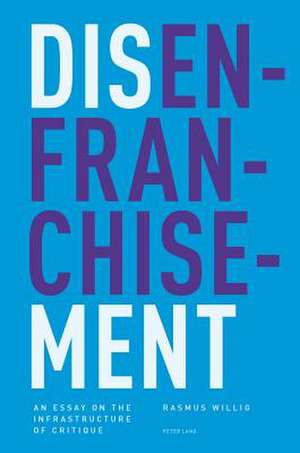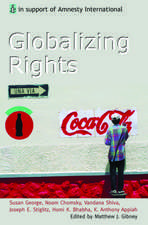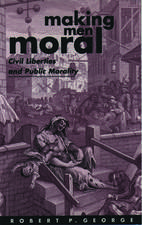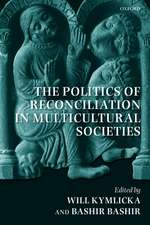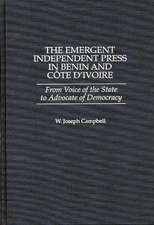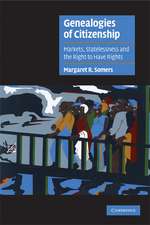Disenfranchisement
Autor Rasmus Willigen Limba Engleză Paperback – 9 iul 2012
The central point of the book is that the inability to criticise is closely related to a more general process of disenfranchisement that is corroding the lives of staff both professionally and privately. Through interviews with kindergarten workers, the book reveals how these processes have resulted in a widespread sense of powerlessness and paralysis.
This book is for anyone who seeks a conceptualisation of the feeling that it has become more worthwhile to keep silent than to speak your mind - a widespread impression in a time when several groups in the public sector, including nurses, teachers, kindergarten workers and police officers, report increased political control and a lack of tolerance of critical voices in a neoliberal era. The book focuses on the informal norms that determine our ability to criticise, rather than on the formal, statutory rights of freedom of speech, press and assembly.
Preț: 455.89 lei
Nou
Puncte Express: 684
Preț estimativ în valută:
87.25€ • 90.75$ • 72.03£
87.25€ • 90.75$ • 72.03£
Tipărit la comandă
Livrare economică 14-28 aprilie
Preluare comenzi: 021 569.72.76
Specificații
ISBN-13: 9783034308465
ISBN-10: 3034308469
Pagini: 112
Dimensiuni: 147 x 224 x 8 mm
Greutate: 0.2 kg
Editura: Peter Lang Gmbh, Internationaler Verlag Der W
ISBN-10: 3034308469
Pagini: 112
Dimensiuni: 147 x 224 x 8 mm
Greutate: 0.2 kg
Editura: Peter Lang Gmbh, Internationaler Verlag Der W
Notă biografică
Rasmus Willig is an associate professor at the Department of Society and Globalisation, Roskilde University, Denmark. He is a former chairman of the Danish Sociological Association.
Cuprins
Contents: Many people feel unable to criticize without fear of reprisals ¿ The profession of kindergarten teacher ¿ Normative processes of disenfranchisement ¿ Organizational processes of disenfranchisement ¿ Safety valves for critique ¿ The unenfranchised children ¿ Critique is concealed and disenfranchisement is reproduced ¿ Towards a theory of the infrastructure of critique ¿ Afterword: `Enlightenment is man¿s release from his self-incurred tutelage¿.
